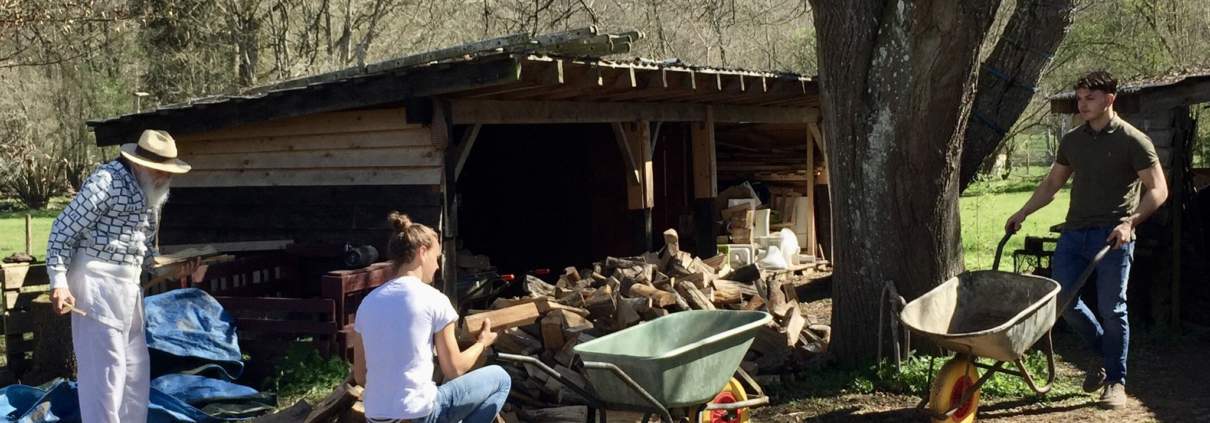
Active Devotion
Every spiritual tradition or spiritual way of living has something which we call Active Devotion. This is of course because of its value.
Nâm, Dao, Karma, Dharma, Sharia, and the ‘Will of God’ are all pointing at Attitudes and Behaviour that optimally Transform Ignorance into the Wisdom of Attunement. Such transformation is mostly achieved with the instrument of Active Devotion.
This is not a devotion of adoration and worship but rather a devotion of involvement and concentration. It is a devotion of Remembering.
It is a powerful way of transformation, it helps us to open ourselves, you can learn so much from it because you come to learn more about yourself and your habitual programmes. Through active devotion you refine yourself, you refine your attitudes, you refine your behaviours and because you direct your energy towards giving to the whole you create something entirely different then when you direct your energy to wanting and getting something for yourself. Active Devotion is directing all of your attention to serving and giving and because this attitude creates bliss and opens you for the Grace of Life it is a way of healing too.
Therefore we like to encourage people to participate to the general work in and around the house in a devoted way. This is possible during a regular visit, you then take on a number of tasks at your own pace, for an hour or two a day and of course that can be more.
If you want to come and work as a volunteer for a couple of months, or become part of a pool to help on a monthly basis, you will be doing Active Devotion throughout the day.
Also during some events, such as the reflection week, a daily block is often built into the programme with Active Devotion.
Why is it so important to participate in this?
The Asharum is a retreat center and retreat is not a goal in itself, it is a tool to transform yourself and work on your inner attitude and the resulting behavior that in turn comes from habitual programmes of perception.
Transforming habitual detrimental programmes into supportive programmes is what it’s all about in living and working within a very specific framework is ideally suited for this.
Active Devotion is therefore an instrument to work on yourself. In this way the daily rhythm with its meditations can be supportive to help transform or put in perspective what you encounter in your work.
Attunement
In the Asharum we try to live in attunement. By this we mean that we always try to realise that we are part of a greater unknowable whole.
This means that everything we encounter in working and in contact with others is part of us as being part of this whole. After all it appears in our world of perception.
Precisely Active Devotion, in which you encounter your own opinions and convictions, is then a constant exercise to find and to stay in attunement. What is more important, expressing my opinion or my keeping my attunement? It is an art not to get into an exchange of opinions with another, but to reflect on why this appears in your world and thereby come into acceptance.
You continuously test your attitude against the bigger whole or Totality by Listening to what this whole asks of you. The starting point here is always the willingness to adapt to Totality rather than the expectation that Totality will adapt to you. The manifestation of this is always in the everyday appearances. This will gradually become more and more visible during the work, where there is also room for conversation and communal exploration about these kind of things.
House of Transformation
Because attunement is the central focus for us, we can make our own interests and visions secondary to a higher goal. And this also causes you to look in the mirror of your own beliefs and convictions and see them for yourself.
With this attunement, it’s easier to do what you need to do instead of following your own likes or dislikes. This creates freedom; ‘getting what I want’ transforms into ‘wanting what I get’.
By finding attunement through the path of transformation, you develop an attitude of active devotion. This makes the Asharum a house of transformation.
Attention
Regardless of the type of work we do, we do it with full attention. It doesn’t matter whether it’s preparing a meal, cleaning the kitchen, guest rooms or bathrooms or working in the garden. It is the attention with which the work is done that can be felt as quality for the guests and with which you contribute to the whole.
It is also said that what you pay attention to grows. That also raises the question, what do you want to focus your attention on?
Everything you choose to direct your attention to gets a certain resonance. And everything you do, everything you say, even what you think has a resonance. That resonance determines what you create and comes back to you as your creation. We call this ‘resonance ethics’. When you choose to have a nice chat about small things or even negative things like for example complaining, it has a different resonance than when, for example, you make a serious attempt to understand more about yourself, how you experience, what you are, what it means to be a human being and so on. And we do not need to judge and put a ‘right or wrong’ on this, these are just observations you can make which you can use in creating beautiful living.
Resonance ethic asks you to take responsibility for your own life and everything you create in it.
Work retreat
You can see active devotion during a regular stay or a volunteer stay as a work retreat, with which you serve a greater whole through the attunement and transformation. With this you cultivate in yourself an inner open attitude that always radiates “What can I do for you?”.
At present, because we are a team of females and because spirituality is differently experienced and has a different approach for men and for woman longer volunteer periodes are only possible for woman. Men who would like to work as volunteers for a longer period of time are most welcome in our retreat centre in Andalucia – Spain where there is a mixed group of residents.
